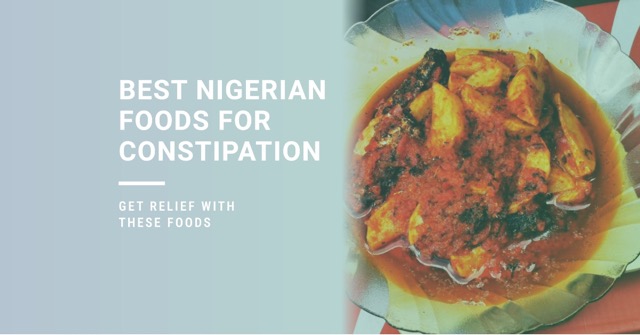Searching for the best Nigerian Foods For Constipation?
In this post you will discover the best Nigerian foods to combat constipation through added fiber, fluids, and other remedies.
Without any further delay let's get to some of the top Nigerian foods that can help get things moving again:

Best Nigerian Foods for Constipation
Here are 13 foods you can find in Nigeria to help relieve constipation through natural means:
1. Papaya (Pawpaw)
Contains both soluble and insoluble fiber which aids digestion. In addition, Paw paw also has digestive enzymes called papain that break down protein.
2. Oranges
Oranges have both soluble and insoluble fiber. One medium orange provides around 10% of daily fiber needs, making them a great constipation reliever needs (1)..
3. Apples
Contain both soluble and insoluble fiber. Even better, the Natural sugars in apples help stimulate bowel movement (2).
4. Pears
Pears are high in fiber and their natural sugars help draw water into intestines to soften stool (3).
5. Kiwi
Kiwi fruits are rich in both soluble and insoluble fiber for easy digestion. Also has vitamins and protein (4).
"Eating whole fruits like papaya, oranges, apples, and pears can provide the right amount and type of dietary fiber to help relieve constipation."
6. Leafy Green Vegetables
Nigerian leafy greens are packed with constipation relieving fiber. For example:
- Ugu (pumpkin leaves) - 1 cup cooked contains 3g fiber. Adds bulk and softness to stool.
- Spinach - High in fiber and nutrients like vitamins A and C.
7. Beans
Different types of Beans like cowpeas, kidney, lima and soybeans are high in soluble and insoluble fiber. Their protein content also aids digestion. Note that they can cause gas so eat in moderation.
8. Sweet Potatoes
Sweet potatoes have constipation-fighting dietary fiber while being low in calories (5,6). Their low glycemic index helps maintain steady blood sugar levels.
9. Oatmeal
Plain oats are best in relieving constipation. Avoid instant packets with added sugar. You can enjoy your oats with fresh fruits, which adds extra fiber.
10. Chia Seeds
Chai seeds are blessed with protein, fiber and healthy fats. Form a gel-like substance when combined with liquid to soften stools. Ensure you drink plenty of water when eating them.
11. Prunes and Dried Fruit
Prunes have both soluble and insoluble fiber. One study showed prunes improved stool frequency and consistency in people with mild constipation (7). Eat in moderation due to high sugar content.
12. Water
Water softens stools and prevents dehydration (which leads to harder stools). Aim for at least 64 oz per day. Avoid sugary drinks which can worsen constipation.
13. Coffee
The caffeine in coffee stimulates the digestive system and bowel movements. But too much can cause dehydration so drink water too.
How to Identify Constipation
Constipation involves having infrequent, difficult, or incomplete bowel movements. There are several key signs and symptoms to look out for:
- Fewer than 3 bowel movements per week - Having less frequent bowel movements is one of the main indicators of constipation. Going 3 or more days without a bowel movement is considered abnormal.
- Hard, dry stools - Constipation leads to stools that are tough, dry and difficult to pass. You may notice your stools are small, pellet-like, or feel incomplete after a bowel movement.
- Straining during bowel movements - You may find yourself straining excessively while trying to have a bowel movement. This includes physical maneuvering like leaning forward, holding your breath, or clenching.
- Bloating and discomfort - Constipation can cause a feeling of fullness, pressure, or bloating in your abdomen. You may also experience cramps, discomfort, or pain.
- Inability to fully empty your bowels - You may feel like you can't completely empty your bowels after a bowel movement. This can leave a lingering sensation that more needs to come out.
"If you are experiencing any symptoms of constipation for more than 3 days, it's a good idea to evaluate your diet and lifestyle habits."
Causes of Constipation
Constipation can be caused by a variety of factors. Here are some of the most common underlying causes:
- Not enough fiber in your diet - Fiber adds bulk to stool and helps move it through the colon. Diets low in high-fiber foods like fruits, vegetables, whole grains, beans and lentils are a frequent cause of constipation.
- Dehydration or not drinking enough fluids - Water and other fluids help soften stool and allow it to pass more easily. Inadequate fluid intake leads to harder, drier stools that are difficult to pass.
- Lack of exercise - Physical activity helps stimulate contractions in the intestines that push along stool. Too little activity can slow down this process and lead to constipation.
- Certain medications - Some medicines like pain medications, antidepressants, iron supplements, antacids, diuretics and others can cause constipation as a side effect.
"In many cases, making simple dietary and lifestyle changes like adding fiber-rich foods, exercising more, and increasing fluids can help relieve constipation."
Lack of Fiber
Fiber comes from plant foods and works by absorbing water in your digestive tract to soften and add bulk to stool. It also promotes healthy muscle contractions. Adults should aim for 25-30 grams of fiber daily. High-fiber foods include:
- Fruits like apples, pears, berries, papaya
- Vegetables such as broccoli, spinach, carrots
- Whole grains like oats, brown rice, whole wheat bread
- Nuts, seeds, beans, lentils
Inadequate Fluid Intake
Water and other fluids help digest food properly and soften stools for easy passage. Dehydration leads to harder stools. Strive to drink 64-80 ounces of total fluids daily. Water is best, along with:
- Herbal tea
- Diluted fruit juices
- Soup broths
- Skim milk
Lack of Exercise
Physical activity stimulates contractions that push stool through the colon. Aim for at least 30 minutes per day of moderate activity like brisk walking. Yoga poses and abdominal exercises also aid healthy bowel function.
Medications
Many medicines like opiates, antacids with calcium or aluminum, iron, and anticonvulsants are linked to constipation. Talk to your doctor about alternatives if this occurs.
See a doctor if simple home remedies don't provide relief within a few weeks. More serious medical conditions could be causing your symptoms.
Ways to Relieve Constipation
There are several dietary changes you can make to get your bowels moving more regularly:
- Eat more high-fiber foods like fruits, vegetables, whole grains, beans, lentils, oats, nuts and seeds. These provide bulk and soften stools.
- Drink plenty of fluids, especially water. Proper hydration helps soften stools and supports healthy digestion.
- Exercise regularly to stimulate bowel activity through abdominal contractions. Even light activity like walking helps.
- Consider a fiber supplement like psyllium husk or methylcellulose if dietary changes aren't enough. Start with lower doses.
- Try natural laxatives in moderation like prune juice, flax seeds, aloe vera juice or teas with senna leaf.
- Limit foods low in fiber like cheese, processed meats, and those made with white flour.
- Reduce stress through yoga, meditation, or relaxation techniques which can aid healthy digestion.
"Making dietary and lifestyle adjustments is often the simplest and safest way to find relief from constipation before turning to laxatives or medications."
Seeking medical advice is recommended if significant changes do not improve your symptoms within a few weeks.
Conclusion on Best Nigerian Foods For Constipation
Constipation can leave you feeling sluggish, bloated and uncomfortable. There are many traditional Nigerian foods that can help provide relief from constipation through natural means:
- Papaya - Contains digestive enzymes and high fiber
- Oranges - Rich in fiber and vitamin C
- Leafy greens - Spinach, kale and ugu offer roughage
- Beans - Excellent source of soluble and insoluble fiber
- Sweet potatoes - Fiber-rich and help regulate blood sugar
- Oatmeal - Go for plain oats over flavored packets
- Chia seeds - Form a gel that softens stool
- Prunes - Proven to improve stool consistency
"Consuming more of these high-fiber fruits, vegetables, and grains can aid digestion and promote regularity."
Importance of Balanced Diet
While these foods can help overcome constipation, it's important to have an overall healthy and balanced diet:
- Eat a variety of fiber-rich foods including beans, lentils, nuts, seeds, whole grains
- Include fruits, vegetables, lean protein, and low-fat dairy
- Limit foods high in fat, sugar, and processed ingredients
Proper nutrition provides the right nutrients to support digestive health long-term.
Stay Active and Hydrated
Along with a fiber-filled diet, regular exercise and adequate hydration promote bowel regularity:
- Get at least 30 minutes of moderate activity daily
- Strength training and abdominal exercises provide added benefit
- Strive for 64-80oz of fluids per day, mainly from water
- Avoid excessive alcohol and sugary beverages
Use Food Remedies in Moderation
While foods like coffee and prunes contain compounds that stimulate bowel movements, moderation is key:
- Too much coffee can cause dehydration
- Prunes are high in natural sugar
- Overuse of stimulant foods can worsen issues long-term
See Your Doctor for Severe Cases
For significant or prolonged constipation, seek medical advice to rule out underlying conditions. Symptoms to look out for include:
- Constipation lasting more than 3 weeks
- Presence of blood in the stool
- Unexplained weight loss
- Intense cramping or abdominal pain
Don't hesitate to get professional care if needed. Your doctor can provide the proper treatment to get your digestive system back on track.
